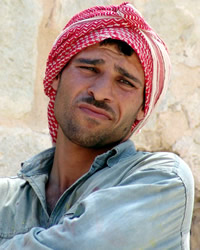Arab, Syrian in Greece

Photo Source:
James Gordon - Wikimedia
Creative Commons
|
Send Joshua Project a map of this people group.
|
| People Name: | Arab, Syrian |
| Country: | Greece |
| 10/40 Window: | No |
| Population: | 8,000 |
| World Population: | 23,523,800 |
| Primary Language: | Arabic, Levantine |
| Primary Religion: | Islam |
| Christian Adherents: | 9.00 % |
| Evangelicals: | 0.10 % |
| Scripture: | New Testament |
| Ministry Resources: | Yes |
| Jesus Film: | Yes |
| Audio Recordings: | Yes |
| People Cluster: | Arab, Levant |
| Affinity Bloc: | Arab World |
| Progress Level: |
|
Introduction / History
The Levant Arabs settled all over the Arabian Peninsula and later migrated to North Africa. They are spread from Israel to Kuwait and as far east as Iran. "Levant" is a broad term that includes several groups of Arabs: the Jordanian, Palestinian, Iraqi, Chaldean, and Syrian Arabs. Each of these speaks a different form of the Arabic language.
Before the Syrian Civil War began in 2011, there were already 18 million Syrian Arabs in Diaspora. This earlier group was mainly comprised of people seeking economic opportunities, though there were also political refugees. Most of these people have financial and educational means. They are (to various degrees) assimilated into a different culture.
Most Syrian war refugees are in Jordan, Lebanon, Turkey or Germany. They also live in dozens of other countries, including Greece.
What Are Their Lives Like?
Those who have taken refuge in Greece are usually living in refugee camps or cheap motels. Some have set up shops to sell snacks, cigarettes, etc. Others wait. Children rarely have school, so they roam around the camps.
Syrians will have to either learn the local language and start a new life there or return to Syria after the war ends.
What Are Their Beliefs?
Levant Arabs have had a close association with Islam throughout much of their history. However, Syrian Arabs have also had an Orthodox or Maronite Christian presence along with the other countries of the Levant region.
What Are Their Needs?
Recent Syrian refugees often face trauma. They suffer from survivor's guilt and shame that they couldn't stop the mayhem. Commonly, they lost homes, friends, and family members. Many need trauma counseling and people to help them get re-established in a new country.
Prayer Points
Pray for loving Christians to offer trauma counseling and other services to suffering Syrian Arabs.
Pray that the Diaspora situation will provide Syrian Arabs the chance to embrace the only savior.
Pray for Syrian Arab Christians who will disciple others and teach them to do the same.
Pray for Syrian Arab family leaders to have dreams of the victorious and righteous Christ and share their experiences with many others.